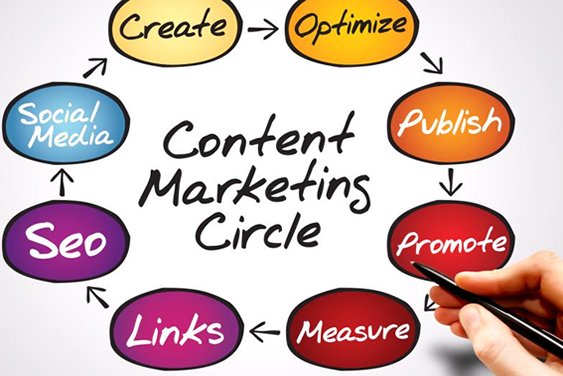When executed properly, digital marketers and marketing departments can realize a much higher ROI from content marketing while spending much less on their marketing budget. But what are people referring to when they use the term “content marketing?” Essentially, it’s a marketing technique which involves creating and publishing relevant and valuable content that appeals to audiences to attract new customers. In this case, brands become like publishers that create content on their own platforms to attract visitors. Content marketing is using content to reach your marketing goals.
Why Is It So Valuable?
Content Marketing is important because every other marketing sector depends on it. Regardless of your marketing strategy and how you plan to target an audience, all of your efforts will depend on some form of content whether it’s email, ad campaigns, social media posts, infographics, blogs, or web pages.
Content is the Foundation of SEO
Basically, content is the foundation of any search engine optimization strategy. Every link points to some type of content, and any keywords entered into a search engine are looking for content. Anything that conveys a message to an audience is content. And content is the means by which marketers achieve reach their goals whether it’s informing existing customers, delivering information to potential customers, or making a sale.
Content Marketing Adds Value to Brands
When it’s done right, content marketing makes your brand more valuable over time as you continue to create good content. The more you offer your audience, the more brand recognition you will have as a leader in your field. And the main way content provides value is through organic traffic. People discover you via search and then visit your content. Organic traffic is valuable because your audience finds you instead of the other way around. Great content gives your audience something to talk about, and it helps your brand become a trusted authority within your industry.
Examples of Content Marketing
The easiest way to get a handle on content marketing is to look at some common examples. There are many different types of content marketing, but the following examples are ones that you see all the time.
1. Web Pages – the pages on your site should be prime examples of content marketing. However, not every web page fits the bill. The content on your site should be written directly for a specific customer and help to answer a question or solve a problem that he or she may have.
2. Videos – Many brands don’t take advantage of video to market their products or services because they think it’s expensive and difficult. Nowadays, that’s just not true. Creating high quality video and audio content is easier than ever. In fact, amateur videos have been used to sell all kinds of products.
3. Infographics – Typically, these are vertical graphics that provide charts, statistics, graphs and other info. They can help brands when they are passed around social media and shared across different platforms. If they provide helpful information, visitors will keep returning to your site as an authority.
4. Blogs – One of the most popular and dependable forms of content marketing, a blog is where a subject matter expert writes about topics relevant to his or her audience on a consistent basis. The goal is to use informative content to grow an audience and build relationships. A blog usually deals with one central topic throughout the length of the post. The general rule of thumb for choosing blog topics is to create what your target audience would want to consume.
The problem with content marketing is that most companies don’t fully understand its benefits because the results take time and aren’t tangible at the beginning. Unfortunately, many companies give up just before they start seeing improvement. That’s why those who are willing to put in the time and effort will be at a distinct advantage.
What sets content marketing apart from other marketing strategies is the return-on-investment and the value it contributes to your brand over time. Through content marketing, any brand can raise their organic search visibility because it revolves around sharing thought leadership. With strong, authoritative content and SEO, content marketing often winds up being the marketing strategy that is most closely aligned with customer needs.





